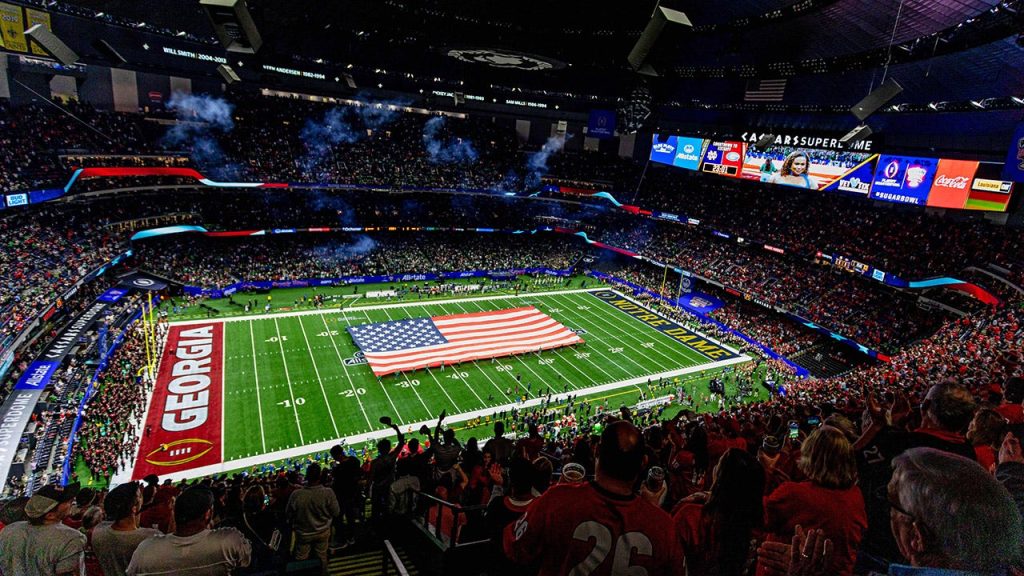The 2025 Sugar Bowl, a prominent event in the American sporting calendar, was dramatically rescheduled following a devastating terrorist attack on New Orleans on New Year’s Day. The tragic incident cast a pall over the festivities, transforming the pre-game ceremony into a poignant tribute to the victims. A moment of silence was observed, followed by a spontaneous and powerful display of unity as fans of both competing teams, Georgia and Notre Dame, erupted into resounding chants of “U-S-A.” This moving scene underscored the unifying power of sports, providing a much-needed sense of solidarity and patriotism in the face of tragedy. However, this powerful moment of national unity was notably absent from the ESPN broadcast, the exclusive carrier of the game.
The omission of the pre-game ceremony, including the moment of silence, the patriotic chants, and even the national anthem, from ESPN’s broadcast sparked widespread criticism and controversy. Many viewers expressed their disappointment and outrage at the network’s decision, questioning the editorial choices that led to the exclusion of such a significant and emotionally charged moment. The network’s silence on the matter only fueled the growing public disapproval, with many accusing ESPN of prioritizing a political agenda over its responsibility to provide comprehensive coverage of a major sporting event. The absence of these elements, particularly in the context of a national tragedy, left many viewers feeling that ESPN had failed to capture the true spirit and significance of the event.
This perceived editorial bias drew sharp comparisons to ESPN’s past coverage of social and political issues within the sports world. Critics pointed to the network’s extensive coverage of athlete protests during the 2020 NBA playoffs, specifically highlighting instances where players knelt during the national anthem to protest racial injustice. The contrast between ESPN’s prominent coverage of these protests and the omission of the patriotic displays at the Sugar Bowl fueled accusations of hypocrisy and selective reporting. The network’s perceived willingness to showcase certain forms of protest while neglecting others raised questions about its impartiality and commitment to objective journalism.
Adding to the controversy was ESPN’s initial reporting on the New Orleans attack. The network’s characterization of the incident as a “truck attack” drew heavy criticism for downplaying the role of the perpetrator, a suspected terrorist reportedly carrying an ISIS flag. This language mirrored ESPN’s earlier coverage of the Waukesha Christmas parade tragedy, where a vehicle driven by a black nationalist plowed through the parade, killing and injuring dozens. Critics argued that this sanitized language obfuscated the intentional and malicious nature of these attacks, minimizing the threat of terrorism and avoiding any discussion of potential ideological motivations. This perceived reluctance to acknowledge the terrorist nature of the attack, in contrast to their willingness to highlight racial justice protests, further reinforced the accusations of bias.
The fallout from ESPN’s Sugar Bowl coverage extended beyond the network itself, engulfing one of the bowl’s corporate sponsors. The CEO of this unnamed sponsor faced backlash for a statement released after the terrorist attack, which some interpreted as promoting division rather than unity. This incident highlighted the delicate balance corporations face in navigating sensitive social and political issues, particularly in the wake of a national tragedy. The CEO’s statement, intended to address the attack, instead became a lightning rod for criticism, demonstrating the potential for missteps and the importance of carefully crafted messaging in such situations.
The controversy surrounding ESPN’s Sugar Bowl broadcast highlighted broader concerns about the intersection of sports, media, and politics. The network’s editorial choices, coupled with its reporting on the New Orleans attack, fueled an ongoing debate about the role of media bias in shaping public perception. The incident underscored the challenges of balancing objective reporting with social and political commentary, and the potential consequences of perceived bias in eroding public trust. The Sugar Bowl controversy served as a stark reminder of the power and responsibility of media organizations in shaping narratives and influencing public discourse, especially during times of national crisis and heightened emotions. It also illustrated how sensitive and potentially divisive issues, such as race, terrorism, and patriotism, can become intertwined with sporting events, creating complex challenges for broadcasters and sponsors alike.

